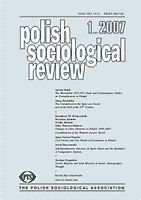The Marienthal 1931/1932 Study and Contemporary Studies on Unemployment in Poland
The Marienthal 1931/1932 Study and Contemporary Studies on Unemployment in Poland
Author(s): Antoni SułekSubject(s): Social Sciences
Published by: Polskie Towarzystwo Socjologiczne
Keywords: unemployment; Great Depression; Marienthal Study; empirical social research; combining methods; sociology in Poland
Summary/Abstract: The paper outlines Polish studies of unemployment in the 1930s—at the times of the well-known study in Marienthal, Austria. They focused on living conditions, social life and psychological well being of the unemployed. They combined various methods and data: statistical data, institutional records, diaries and memoirs, family interviews, and sample surveys. Research started with simple descriptions of life style of the unemployed and ended with an elaborate empirical study, cross-country comparisons and theory of unemployment. The image of unemployment and its consequences was parallel to the Marienthal study results—unemployment caused not only poverty, but also apathy and disintegration of social life. The Marienthal study was known in Poland at the time and to some extent served as an inspiration. The case of Polish unemployment studies in 1930s shows how sociography transformed into sociology. It shows the birth of common method of social research in Central Europe that was so unexpectedly put to a holt by Nazism and the Second World War.
Journal: Polish Sociological Review
- Issue Year: 157/2007
- Issue No: 1
- Page Range: 3-25
- Page Count: 22
- Language: English

